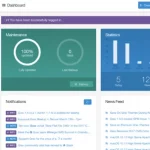We often hear from potential employees that they don’t have a computer science degree, and yet the skills are needed for web development. Is this true? Do you need to be a computer scientist to become a web developer? And why does it matter if there is no formal education in place?

Table of Contents
What is a web developer?
Web developers are responsible for the design, usability and back-end functionality of websites. They use programming languages like HTML to build out a web page’s content and CSS for its aesthetic features. Web developers can also work with JavaScript (to make things happen in browser), PHP or Ruby on Rails (for server side interactions) to help manage databases or perform other tasks that might require more coding knowledge than front end development skills.
A major part of their job is ensuring that they have followed best practices so as not to jeopardize site security which could lead users away from trusting them again in the future.
What’s a computer scientist?
A computer scientist’s main responsibility is to design software. They are more involved in the technical side of things and have a lot of knowledge about how computers work as they’re building them, not unlike carpenters or electricians who know how their tools work because it helps them be more efficient at what they do.
A major part of their job is planning out new technologies before designing or developing solutions for specific problems that can help businesses grow – think “think tank” rather than front-line engineers. Computer scientists also use programming languages like C++, Java or Python but often build prototypes with those languages instead of deploying final products on websites where web developers would usually handle these tasks.
Computer scientists don’t always need computer science degrees either; some people – like Bill Gates and Steve Jobs – are self-taught.
The future of web development is in computing, not engineering… Computer science degrees may be useful for those who want to specialize but don’t have the skills or patience to teach themselves how computers work from a computer scientist’s perspective.
Does a web developer need to have a computer science degree?
In theory, yes. According to some experts in this field, programming knowledge is required for someone who wants to become an entry level web developer. However, there are instances when it’s possible for non-computer scientists or people without formal education in coding and development get work as web developers via on-the-job training programs called boot camps (or code schools).
A study by a university found that students without computer science degrees were able to master skills needed for becoming full stack software engineers within three months at one such program.
The advantages of these type of intensive courses include short time commitments both from employers and employees, as well as the opportunity for people to be employable with just a few weeks of training.
It’s important to note that there are drawbacks too. The study cited found only a 68% success rate for students who enrolled in these types of programs, meaning out of every three people with no formal computer science degree who participated in the course, two will not be successful. Furthermore, some employers may prefer applicants who have gone through traditional education pathways and might find boot camps as risky due to their lack of guarantees (i.e., they cannot predict whether or not someone is going to learn how to code). Boot camp graduates also can’t always start at entry level positions so it would still take time before being able to apply what has been learned on day one.
But an increasing number of companies are beginning hire web developers without college degrees, and they are even willing to train college dropouts.
Companies like Facebook have been known to hire people who don’t necessarily know how to code right away but offer the possibility of teaching themselves on the job. Google is also notable in that it hires from a variety of backgrounds, including those without computer science degrees or traditional educational backgrounds for software engineering roles with no front-end web development experience required.
When deciding whether or not someone has what it takes to become a developer, employers consider their ability to acquire new skills quickly as well as general knowledge about programming languages and formats . Employers will usually want candidates who can show proficiency using popular coding languages such as HTML/CSS, JavaScript (or jQuery), SQL, Ruby, Python, etc.
Programming languages, such as Java or C++, are based on formal mathematical notation and logic that is both more complex to learn than the average high school curriculum and can be counterintuitive in practice . This makes it difficult for those without a degree in computer science to master them.


